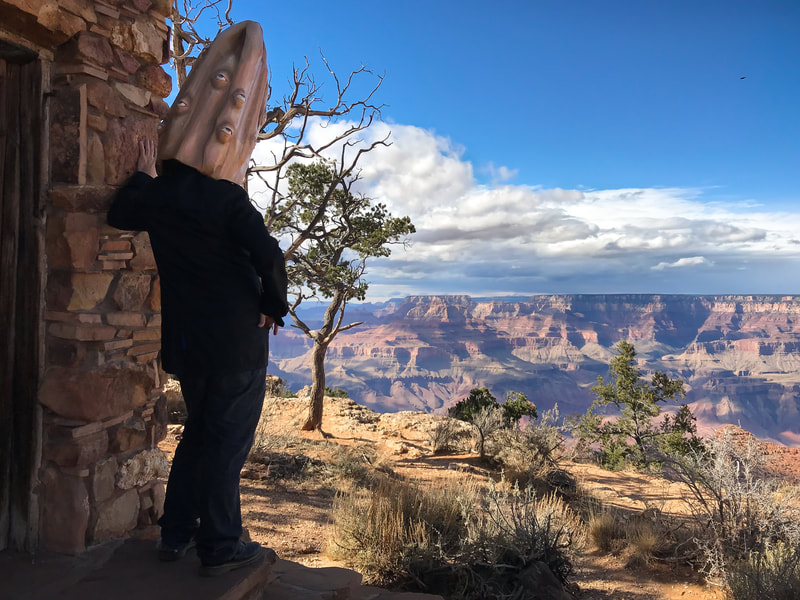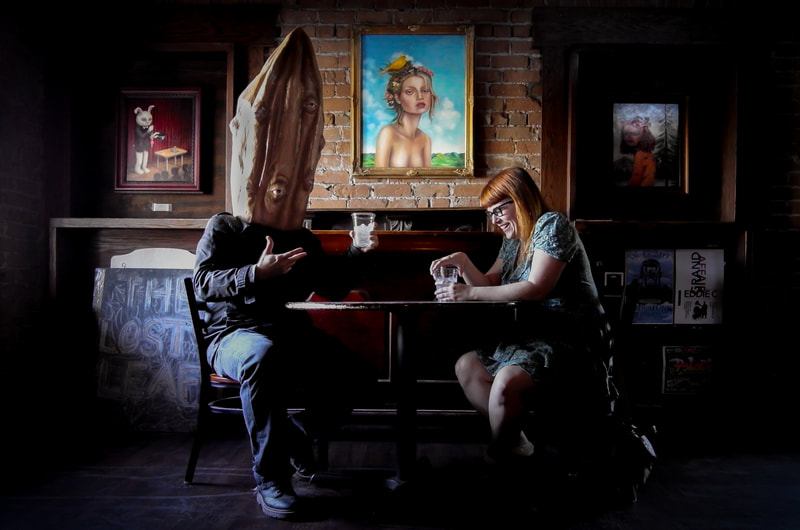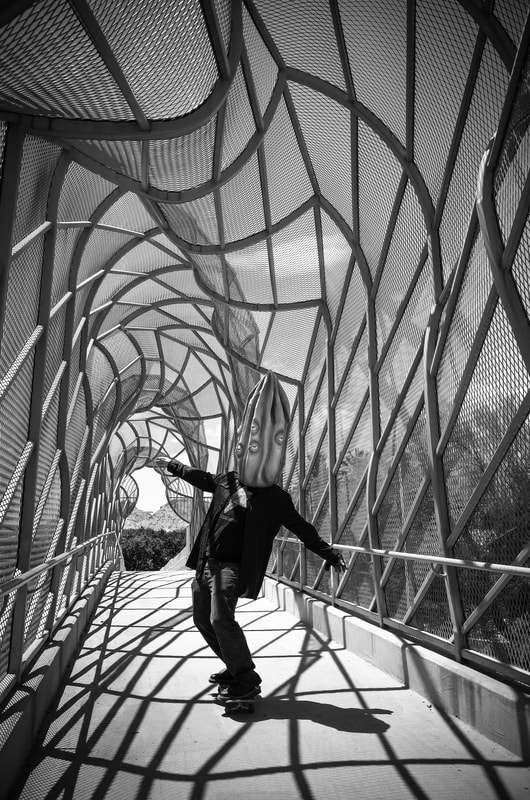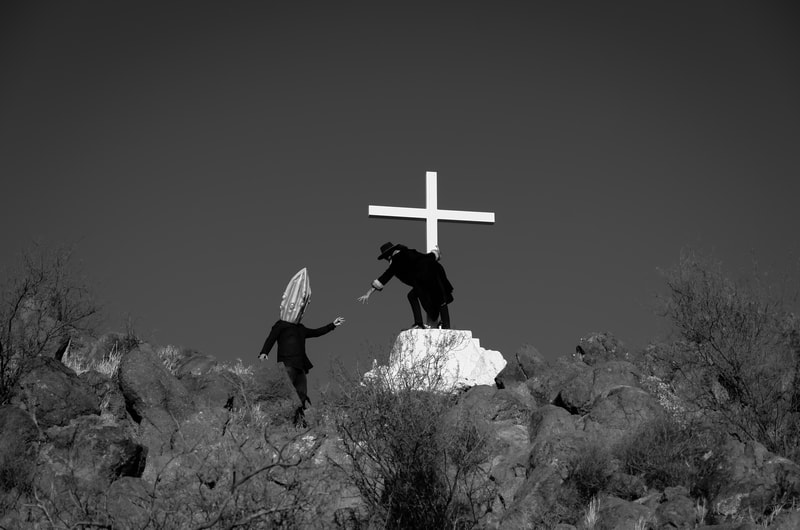Gravity & Spectacle by Jia Oak Baker and Shawnte Orion
Publisher: Tolsun Books (2020) 88pp.
Purchase @ Tolsun Books
Purchase @ Tolsun Books
Review by Alina Stefanescu.
The Re-Visioning Nostalgia: A review of Baker and Orion, Gravity & Spectacle
This mixed media collection of poetry and photography develops placehood inside an intimate, remembered Arizona. The poets perform a subversive mourning that expands the elegiac form to include community, relationships, and the self cognized in nostalgia. I suspect Orion and Baker bring nostalgia close to camp and absurdity not to deny longing but to protect it from criticism.
Gravity: the photos
Absurdist humor relies on violations of causal reasoning, culminating in events and scenes and behaviors that challenge logic. Absurdism shares with surrealism its wacky juxtapositions and incongruities, its non-sequiturs and irrational set-ups, its centering and privileging of bizarreness as discourse. The photos of "Gravity" combine visual absurdity with nostalgia by centering Flesh Cactus, a silent character performed by Shawante Orion wearing the Flesh Cactus mask purchased from J. J. Horner, a local "paintbrush wizard" and skate shop owner.
We follow Flesh Cactus through an emerging psychogeography of vacant spaces and ruins where gentrification and progress seem questionable. The titles of the photographs are the only clues into Flesh Cactus' mental states as they appear in abandoned computer warehouses, experimental communities, bridges, state fairs, banks, hotels, many local shops and cafes and local music venues, patches of desert, a church in New Mexico, an outdoor mural, etc. By the end of the visual journey, Flesh Cactus becomes a reliable narrator, a stable form in a shifting terrain. They are what we know Arizona.
"Grand Eyefull of the Hollow", taken at the South Rim of Grand Canyon National Park, embodies the tension of perspective in this book--the absurdity of the narrator looking with longing at a natural wonder, looking surreal, and yet real, in his rapture. I am reminded of Eugene Ionesco, and the way theatre of the absurd was anchored in concerns about authenticity and truth. Like Ionesco, Orion rejects the binary, describes himself on the book's back jacket as "the poseur wearing the mask". This is his bio. Like Ionesco, somehow, it is a defense of longing.
Spectacle: the text
The text begins with "Six Six Six Oh Two", a sort of retro location with dial tones attached. But the zip code is for Baton Rouge, Lousiana, and not the Arizona which emerges as both setting and character in this poem. The saguaro cactus makes its entrance, flipping tourists off, being prickly--the tone is glib, mordant, flipped.
The monsoon sun is a billboard
advertising back sweat
and the official
State Bird of Arizona
is the Ceiling Fan.
This landscape of pollutants and postcards is developed further in "Dusk in the Forecast":
sunsets are complicit in their own consumption
fluorescent romance of carcinogens
dirty thoughts make the kiss last
The cactus is personified again, or characterized, in "The Beholder at the Edge of Daylight Savings", the poem that references the "Grand Eyefull of Hollow" photo:
a saguro needs a decade
to grow its first inch and half
thirty-five years for its first corsage
seventy years for an outstretched arm
Again, we see this privileging of the bizarre as a reliable narrator, the earnesty hidden behind the mask, in a use of humor that doesn't hide affection for what is ultimately tacky and kitsch. The tribute to weirdness continues as the poets honor former Arizona bands on a once-vibrant Phoenix underground music scene by titling each section of "Desert Tarot Six Card Spread" after one of those bands.
"Forever Like the Stamp On Your Wrist" exploits nostalgia to indulge, again, in a tender absurdist mourning whose poignance is amplified by clever lineation:
because air conditioning
never opens for my friend's band
they play three and half songs
before the cops show up
ten dollars in advance
gentrification at the door
The attention to particulars of the underground music scene continues in a series of poems titled for "SWXSW Shizz Fest," a local stand-up music event without hierarchies or gatekeepers. In these poems, too, there are glimpses of something lost:
serving pay-what-you-can frybread
cooked on an ironing board
remember that the city was beautiful
before they tried to make it beautiful
And all these details are tributes which preserve a specific aspect of Phoenix, a time and place that is being buried. The poet speaks through masks, costumes, private references, vulnerabilities, and alter egos (directly in the poem "The Secret Lives of Alter Egos"). Nothing is inappropriate. Nothing is untouched, somehow, by the appropriations of Chambers of Commerce and development. The We in these poems refers to peers and those who partook of that Phoenix, but the poems, themselves, are addressed to the place and its gentrifying inheritants.
"Cul-de-Sacrifice" is a quiet wail against the developments rising to replace communities where vines and red dirt have been eradicated to build temples to some god dressed as Progress. The "coyotes" are the "evicted" ones who carry the burden of mourning in this poem.
There is the newness, the cultural backdrops, the poem that critiques the clickbaited brain, the one that consists of one-star Yelp reviews of Heaven, the cutting "Fresh Sanctioning for Rotting Purists," and all the ways in which being hip is plotted against being the credible fuck-up, the heartbreak of Chris Cornell's death, the muffled critique of the new place that appears, namely, the chic Portland.
Even the anti-Trump poem, "Make Orwellian Dystopia Science Fiction Again," relies on absurd juxstapositions, words said by the Swamp King without doing him the honor of a proper noun. To name is to love for Orion. To name is to preserve, to mask, to fondle. Baker and Orion name the loved places in an unmoored interior geography. In doing this, they encourage us to name, preserve, and inhabit our own.
The Re-Visioning Nostalgia: A review of Baker and Orion, Gravity & Spectacle
This mixed media collection of poetry and photography develops placehood inside an intimate, remembered Arizona. The poets perform a subversive mourning that expands the elegiac form to include community, relationships, and the self cognized in nostalgia. I suspect Orion and Baker bring nostalgia close to camp and absurdity not to deny longing but to protect it from criticism.
Gravity: the photos
Absurdist humor relies on violations of causal reasoning, culminating in events and scenes and behaviors that challenge logic. Absurdism shares with surrealism its wacky juxtapositions and incongruities, its non-sequiturs and irrational set-ups, its centering and privileging of bizarreness as discourse. The photos of "Gravity" combine visual absurdity with nostalgia by centering Flesh Cactus, a silent character performed by Shawante Orion wearing the Flesh Cactus mask purchased from J. J. Horner, a local "paintbrush wizard" and skate shop owner.
We follow Flesh Cactus through an emerging psychogeography of vacant spaces and ruins where gentrification and progress seem questionable. The titles of the photographs are the only clues into Flesh Cactus' mental states as they appear in abandoned computer warehouses, experimental communities, bridges, state fairs, banks, hotels, many local shops and cafes and local music venues, patches of desert, a church in New Mexico, an outdoor mural, etc. By the end of the visual journey, Flesh Cactus becomes a reliable narrator, a stable form in a shifting terrain. They are what we know Arizona.
"Grand Eyefull of the Hollow", taken at the South Rim of Grand Canyon National Park, embodies the tension of perspective in this book--the absurdity of the narrator looking with longing at a natural wonder, looking surreal, and yet real, in his rapture. I am reminded of Eugene Ionesco, and the way theatre of the absurd was anchored in concerns about authenticity and truth. Like Ionesco, Orion rejects the binary, describes himself on the book's back jacket as "the poseur wearing the mask". This is his bio. Like Ionesco, somehow, it is a defense of longing.
Spectacle: the text
The text begins with "Six Six Six Oh Two", a sort of retro location with dial tones attached. But the zip code is for Baton Rouge, Lousiana, and not the Arizona which emerges as both setting and character in this poem. The saguaro cactus makes its entrance, flipping tourists off, being prickly--the tone is glib, mordant, flipped.
The monsoon sun is a billboard
advertising back sweat
and the official
State Bird of Arizona
is the Ceiling Fan.
This landscape of pollutants and postcards is developed further in "Dusk in the Forecast":
sunsets are complicit in their own consumption
fluorescent romance of carcinogens
dirty thoughts make the kiss last
The cactus is personified again, or characterized, in "The Beholder at the Edge of Daylight Savings", the poem that references the "Grand Eyefull of Hollow" photo:
a saguro needs a decade
to grow its first inch and half
thirty-five years for its first corsage
seventy years for an outstretched arm
Again, we see this privileging of the bizarre as a reliable narrator, the earnesty hidden behind the mask, in a use of humor that doesn't hide affection for what is ultimately tacky and kitsch. The tribute to weirdness continues as the poets honor former Arizona bands on a once-vibrant Phoenix underground music scene by titling each section of "Desert Tarot Six Card Spread" after one of those bands.
"Forever Like the Stamp On Your Wrist" exploits nostalgia to indulge, again, in a tender absurdist mourning whose poignance is amplified by clever lineation:
because air conditioning
never opens for my friend's band
they play three and half songs
before the cops show up
ten dollars in advance
gentrification at the door
The attention to particulars of the underground music scene continues in a series of poems titled for "SWXSW Shizz Fest," a local stand-up music event without hierarchies or gatekeepers. In these poems, too, there are glimpses of something lost:
serving pay-what-you-can frybread
cooked on an ironing board
remember that the city was beautiful
before they tried to make it beautiful
And all these details are tributes which preserve a specific aspect of Phoenix, a time and place that is being buried. The poet speaks through masks, costumes, private references, vulnerabilities, and alter egos (directly in the poem "The Secret Lives of Alter Egos"). Nothing is inappropriate. Nothing is untouched, somehow, by the appropriations of Chambers of Commerce and development. The We in these poems refers to peers and those who partook of that Phoenix, but the poems, themselves, are addressed to the place and its gentrifying inheritants.
"Cul-de-Sacrifice" is a quiet wail against the developments rising to replace communities where vines and red dirt have been eradicated to build temples to some god dressed as Progress. The "coyotes" are the "evicted" ones who carry the burden of mourning in this poem.
There is the newness, the cultural backdrops, the poem that critiques the clickbaited brain, the one that consists of one-star Yelp reviews of Heaven, the cutting "Fresh Sanctioning for Rotting Purists," and all the ways in which being hip is plotted against being the credible fuck-up, the heartbreak of Chris Cornell's death, the muffled critique of the new place that appears, namely, the chic Portland.
Even the anti-Trump poem, "Make Orwellian Dystopia Science Fiction Again," relies on absurd juxstapositions, words said by the Swamp King without doing him the honor of a proper noun. To name is to love for Orion. To name is to preserve, to mask, to fondle. Baker and Orion name the loved places in an unmoored interior geography. In doing this, they encourage us to name, preserve, and inhabit our own.
Shawnte Orion attended Paradise Valley Community College for one day. He is the author of two recent collections of poetry: The Existentialist Cookbook (NYQBooks) and Faithful as the Ground (Five Oaks Press). His poems appear in The Threepenny Review, Barrelhouse, New York Quarterly, Sugar House Review, and elsewhere. He serves on the editorial board for Rinky Dink Press and has performed in bookstores, bars, universities, hair salons, museums, and laundromats. Visit batteredhive.blogspot.com.
Jia Oak Baker's poetry chapbooks include Crash Landing in the Plaza of an Unknown City (Dancing Girl Press) and Well Enough to Travel (Five Oaks Press). Her photography can be seen in *82 review, Lime Hawk, Shrew, Rascal, Thimble Literary Magazine, Stirring: A Literary Collection, A Dozen Nothing, and elsewhere. Jia received a 2015 grant from the Arizona Commission on the Arts and has been awarded residencies from the Helene Wurlitzer Foundation and Hedgebrook. See more on Instagram @violetsky29.
Jia Oak Baker's poetry chapbooks include Crash Landing in the Plaza of an Unknown City (Dancing Girl Press) and Well Enough to Travel (Five Oaks Press). Her photography can be seen in *82 review, Lime Hawk, Shrew, Rascal, Thimble Literary Magazine, Stirring: A Literary Collection, A Dozen Nothing, and elsewhere. Jia received a 2015 grant from the Arizona Commission on the Arts and has been awarded residencies from the Helene Wurlitzer Foundation and Hedgebrook. See more on Instagram @violetsky29.





